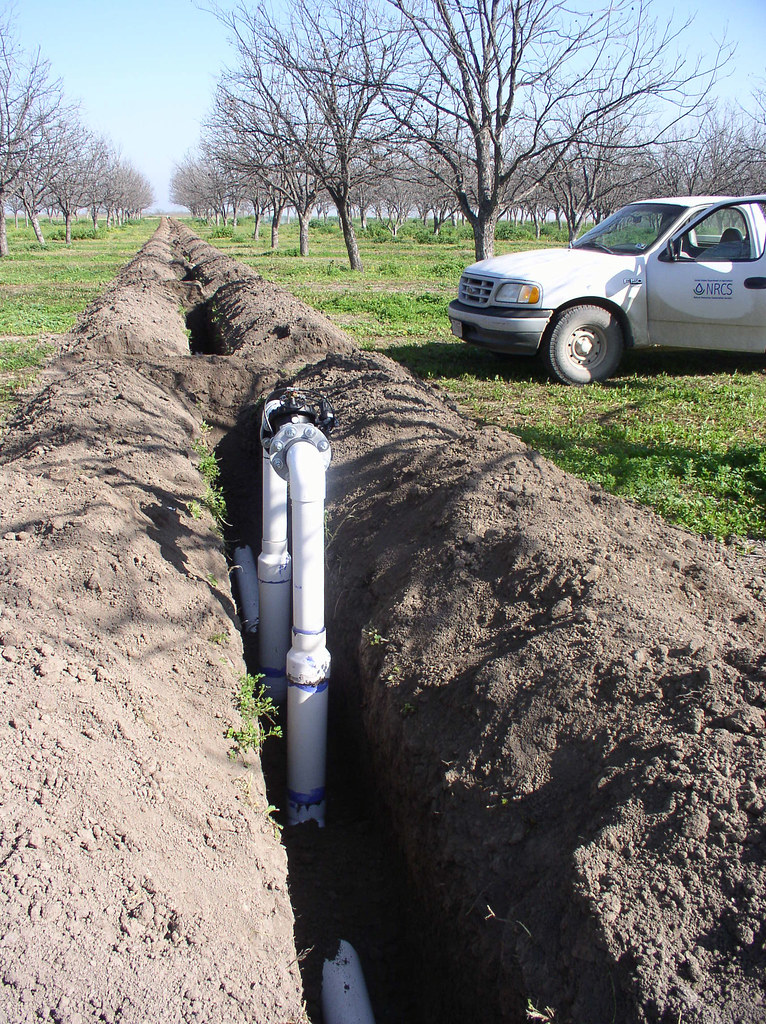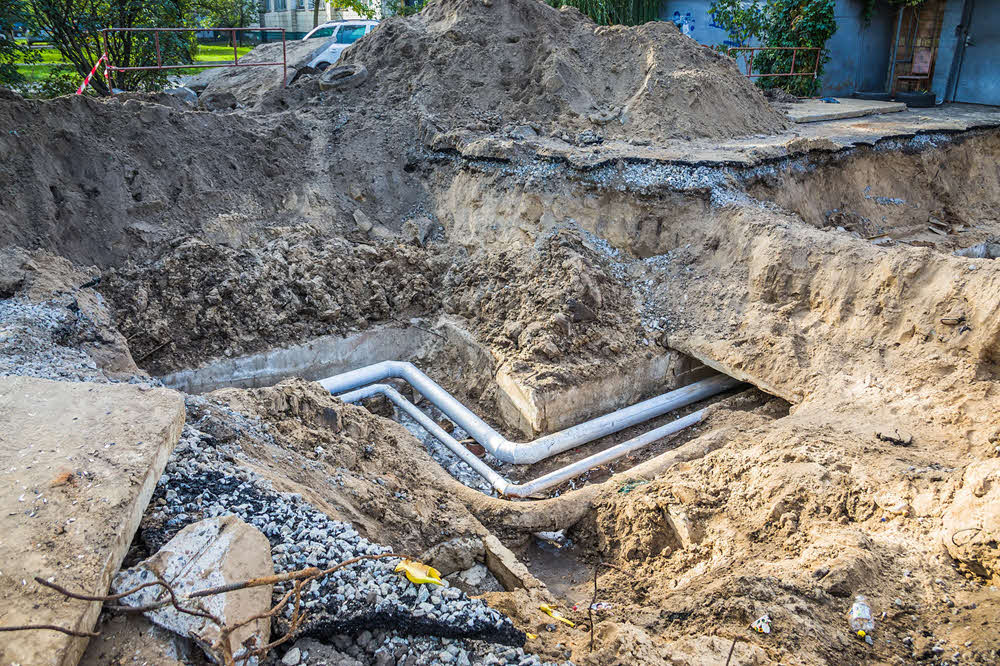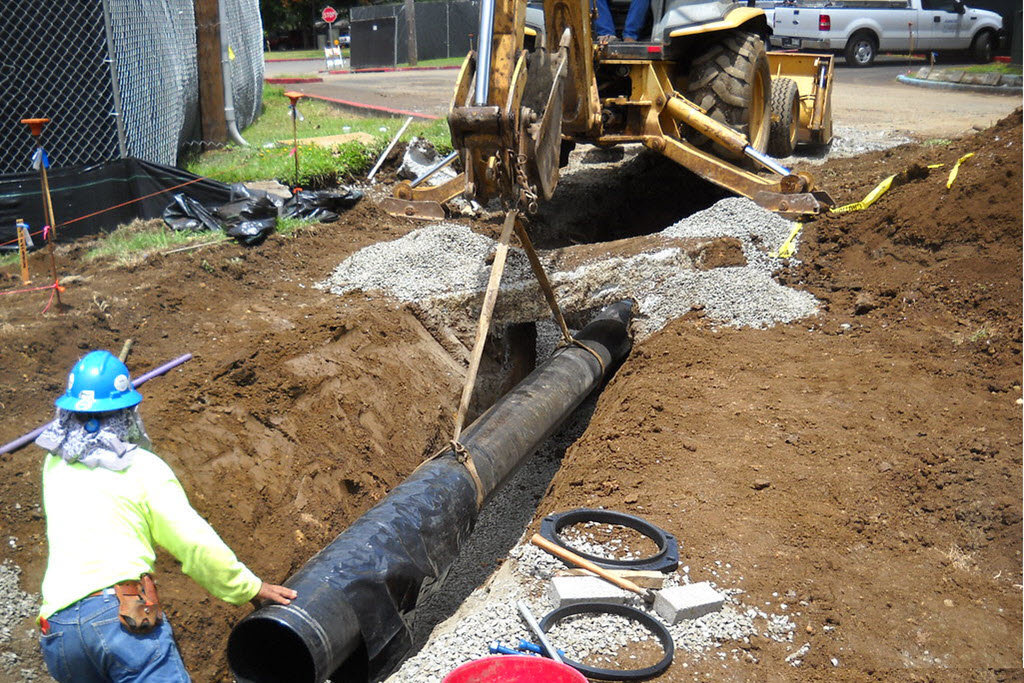Trenching Water Line Servicesin Auburn Hills MI
Trenching for Water Lines to Ensure Reliable Water Flow
We Are Locally Owned & Operated For Over 37 Years
Contact Us Today!
We Serve Businesses In And Around The Following Cities:
About Trenching Water Line Services
Introduction to Trench for Water Line
For any Auburn Hills commercial property, whether it’s a retail space, an office building, or a hospitality facility, an efficient, functional water line is absolutely essential. Properly installed and maintained water lines contribute remarkably to the smooth functioning of daily operations. Among the various methodologies for water main installations, adopting a ‘Trench For Water Line’ approach has increasingly gained ground in both utility and popularity for its effectiveness and efficiency.
The Trench for Water Line Process
The ‘Trench for Water Line’ process begins with a thorough understanding of the commercial property’s irrigation system and a detailed study of the site’s topography, soil condition, and utility services. Upon gaining the necessary insights, our experts at D&J Contracting commit to developing a well-informed excavation plan. We adhere strictly to the procedures specified in Auburn Hills building codes and regulations.
After plan approval, the next step involves diligent digging of a trench that accommodates the new water service line—honoring safety standards and causing minimum disruption to property. Our professionals exercise meticulous care during the procedure, forethought goes into mitigating risks of damaging existing utility services, and preventing soil erosion.
The next stage of Trench for Water Line involves installing the water service line. This stage, while integral, requires a precise assessment of the waterline material and its adaptability with the environmental elements to prevent future complications. Post-installation, the filled trench settles over time, naturally integrating into the landscape.
Benefits of Choosing Trench for Water Line Methodology
The Trench For Water Line methodology brings several unique advantages that promote cost reduction, time efficiency, and operational resilience. One of the key benefits is its ability to facilitate easy detection of issues. With the water line positioned easily accessible in a trench, any problems can be identified swiftly. This quick detection not only saves money on extensive repairs but also minimizes the downtime period, thus saving commercial properties from operational inconvenience.
D&J Contracting, committed to providing quality service solutions, recommends adopting the Trench for Water Line approach due to its long-term sustainability. The use of this technique allows for the installation of larger, longer-lasting water lines that provide superior water pressure and volume. Furthermore, the trench’s position on relatively higher ground than the water line reduces the risk of water contamination.
Real-World Applications in Auburn Hills
Several local businesses across Auburn Hills have benefited from the trenching method for installing their water service lines. One such instance involves a notable hospitality property struggling with recurring water issues. When approached, we at D&J Contracting proposed executing a Trench For Water Line. Upon adopting this process, the property not only resolved their persistent water problems but also managed to ward off potential complex problems.
Another example of a local business gaining from this methodology is a healthcare facility in Auburn Hills. The facility required a new water line to support its increasing water demand. The trenching solution suggested and executed by D&J Contracting helped in restoring their water supply effectively, ensuring smooth patient care services.
The Route to Expert Trench Services
Understanding the essentiality of efficient water supply lines for business operations and acknowledging the manifold benefits, it’s crucial to hire experts to accomplish the task of a ‘Trench For Water Line.’ Auburn Hills businesses can trust D&J Contracting for professional services assured with adherence to local building codes and a customer-centric approach.
In conclusion, as a commercial property owner or manager in Auburn Hills, an investment in Trench For Water Line proves well-spent. It is not a mere installation process but a sustainable solution. It aids in achieving operational resilience, cost savings, and long-term convenience. Embrace the competence of D&J Contracting for your water line trenching needs to rest assured of quality, efficiency, and professionalism.
Trenching Water Line Services Gallery


Call Us Today to receive your Free Quote for
Trench For Water Line in Auburn Hills
Serving: Auburn Hills, Michigan

About Auburn Hills, Michigan
In 1908, automobile pioneer John Dodge bought a farmhouse 3 miles (4.8 km) northeast of Auburn Heights to use as his country retreat. His oldest child, Winifred Dodge, married real estate baron Wesson Seyburn, who built his own country retreat 2.5 miles (4.0 km) north of Auburn Heights. The estate included hunting land, dog kennels, a swimming pool, horse stables, and a 5,000-square-foot (460 m) Colonial Revival house. Pontiac Township purchased the estate in 1976, and adapted the buildings for government use. Today, it is known as the Auburn Hills Civic Center.
The first use of the name “Auburn Hills,” in 1964, was by Oakland Community College. They named their campus (a former Nike missile base) at Featherstone and Squirrel roads for the town and the hilly terrain in the area. Besides Oakland Community College, three other colleges, Oakland University, Baker College, and Western Michigan University Thomas M. Cooley Law School have campuses partially within the city limits.
Auburn Hills began as Pontiac Township, including the village of Auburn, in 1821, at what is today the corner of Auburn and Squirrel roads. Situated on the Clinton River, it was named by Aaron Webster, the first settler, for Auburn, New York. His sawmill and grist mill attracted settlers to Auburn. After the streets were laid out in 1826, Auburn rivaled nearby Pontiac until the 1860s, when it lost its own prosperity. The town was renamed Amy in 1880, and it officially became Auburn Heights in 1919. Pontiac Township bordered the city of Pontiac on two sides. The township attempted to incorporate as Pontiac Heights in 1971, but was denied by state officials. Pontiac Township became a charter township in 1978, to protect itself from further annexation. In 1983, Pontiac Township merged with the village of Auburn Heights to become the City of Auburn Hills. It is not to be confused with the similarly named city of Auburn, Michigan, that exists in Bay County, near Saginaw Bay.
According to the United States Census Bureau, the city has a total area of 16.64 square miles (43.10 km), of which 16.60 square miles (42.99 km) is land and 0.04 square miles (0.10 km) (0.24%) is water.
| Census | Pop. | Note | %± |
|---|---|---|---|
| 1880 | 111 | — | |
| 1990 | 17,076 | — | |
| 2000 | 19,837 | 16.2% | |
| 2010 | 21,412 | 7.9% | |
| 2020 | 24,360 | 13.8% | |
| U.S. Decennial Census | |||
As of the census of 2010, there were 21,412 people, 8,844 households, and 4,923 families living in the city. The population density was 1,289.9 inhabitants per square mile (498.0/km). There were 9,965 housing units at an average density of 600.3 per square mile (231.8/km). The racial makeup of the city was 66.3% White, 18.5% African American, 0.3% Native American, 8.9% Asian, 2.7% from other races, and 3.4% from two or more races. Hispanic or Latino of any race were 7.8% of the population.
There were 8,844 households, of which 27.0% had children under the age of 18 living with them, 38.8% were married couples living together, 12.4% had a female householder with no husband present, 4.5% had a male householder with no wife present, and 44.3% were non-families. 33.5% of all households were made up of individuals, and 7.3% had someone living alone who was 65 years of age or older. The average household size was 2.24 and the average family size was 2.90.
The median age in the city was 31.4 years. 19.4% of residents were under the age of 18; 17.8% were between the ages of 18 and 24; 31.9% were from 25 to 44; 21.6% were from 45 to 64; and 9.4% were 65 years of age or older. The gender makeup of the city was 48.4% female and 51.6% male.
As of the census of 2000, there were 19,837 people, 8,064 households, and 4,604 families living in the city. The population density was 1,194.5 inhabitants per square mile (461.2/km). There were 8,822 housing units at an average density of 531.2 per square mile (205.1/km). The racial makeup of the city was 75.92% White, 13.22% African American, 0.32% Native American, 6.33% Asian, 0.04% Pacific Islander, 1.56% from other races, and 2.61% from two or more races. Hispanic or Latino of any race were 4.50% of the population.
There were 8,064 households, out of which 26.7% had children under the age of 18 living with them; 43.0% were married couples living together; 10.5% had a female householder with no husband present and 42.9% were non-families. 33.1% of all households were made up of individuals, and 6.0% had someone living alone who was 65 years of age or older. The average household size was 2.25 and the average family size was 2.92.
The age distribution is 20.4% under the age of 18, 15.9% from 18 to 24, 38.1% from 25 to 44, 18.2% from 45 to 64, and 7.3% who were 65 years of age or older. The median age was 31 years. For every 100 females, there were 98.3 males. For every 100 females age 18 and over, there were 97.5 males.
The median income for a household in the city was $51,376, and the median income for a family was $60,849. Males had a median income of $45,686 versus $34,015 for females. The per capita income for the city was $25,529. About 3.9% of families and 6.3% of the population were below the poverty line, including 6.4% of those under age 18 and 4.4% of those age 66 or over.
School districts serving sections of Auburn Hills include Avondale School District, Pontiac School District, and Rochester Community Schools.
The Avondale School District operates two elementary schools in the city limits: R. Grant Graham Elementary School and Auburn Elementary School. Portions of Auburn Hills in ASD are zoned to these schools. All ASD residents are zoned to Avondale Middle School in Rochester Hills and Avondale High School in Auburn Hills. Other ASD facilities in Auburn Hills include the district administrative offices and Avondale Montessori. A Pontiac school district school, Will Rogers Elementary School, is located in northeastern Auburn Hills.
Private schools in Auburn Hills include:
- Auburn Hills Christian School
- Oakland Christian School
Private schools near Auburn Hills:
- Notre Dame Preparatory/Marist Academy, Pontiac
- Holy Family Regional School (HFRS) – Consists of a grade PK-3 North Campus in Rochester and a 4-8 South Campus in Rochester Hills. Two churches in Auburn Hills designate HFRS as the parish school: St. John Fisher Chapel and Sacred Heart of the Hills. The first two sponsored the school from the beginning and the other three joined later, with Sacred Heart being the final one.
The main campus of Oakland University sits within Auburn Hills. Oakland Community College, Baker College, and Western Michigan University Thomas M. Cooley Law School are also situated in Auburn Hills.
Call Us Today to receive your Free Quote for
Trench For Water Line in Auburn Hills
Related Services in Auburn Hills, Michigan
We Serve Businesses In The Following Zip Codes:
48007, 48015, 48021, 48026, 48035, 48036, 48038, 48042, 48043, 48044, 48045, 48046, 48047, 48048, 48050, 48051, 48066, 48071, 48080, 48081, 48082, 48083, 48084, 48085, 48088, 48089, 48090, 48091, 48092, 48093, 48098, 48099, 48225, 48230, 48236, 48310, 48311, 48312, 48313, 48314, 48315, 48316, 48317, 48318, 48397